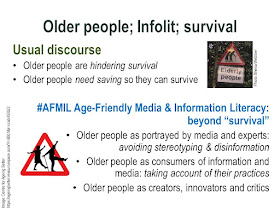Today I (Sheila Webber) participated in a panel at the LILAC (Information Literacy) conference, together with Drew Whitworth, Geoff Walton, Alison Hicks and my colleague & fellow blogger Pam McKinney. The session starts with a short "provocation" from each of us, and mine is on older people, infolit and survival. I thought I'd blog my slide since in particular I want to identify that the age positive logo is from the Centre for Ageing Better's image bank (the other photo is one I took of a British street sign).
Firstly I identify two common ways that people talk about older people: the first is portraying older people as a burden, a problem, a dead weight that is threatening the survival of anyone younger; the second portrays older people as in need of saving, as lonely and helpless poor things. In the context of information literacy this means seeing them as needing others to remedy their deficiencies in finding and using information (e.g. health information) and deficiences in being able to use technology to communicate.
This stereotyping is harmful to older people who want to survive, but also do more than just "survive". In the bottom half of the slide I present the three roles which Bill Johnston and I have identified for Age Friendly media and information literacy. The first role is for everyone: avoiding steroetyping and disinformation in portraying older people. The second involves giving older people a role as consumers of information - finding out their preferences and practices (and not assuming that their practices are "wrong" because they aren't the same as younger people's). The third role is about agency and creativity - seeing older people as being entitled to opportunities to exercise their creativity with information and media.
The Image: Centre for Ageing Better https://ageingbetter.resourcespace.com/?r=8601&k=ccab450b22
No comments:
Post a Comment